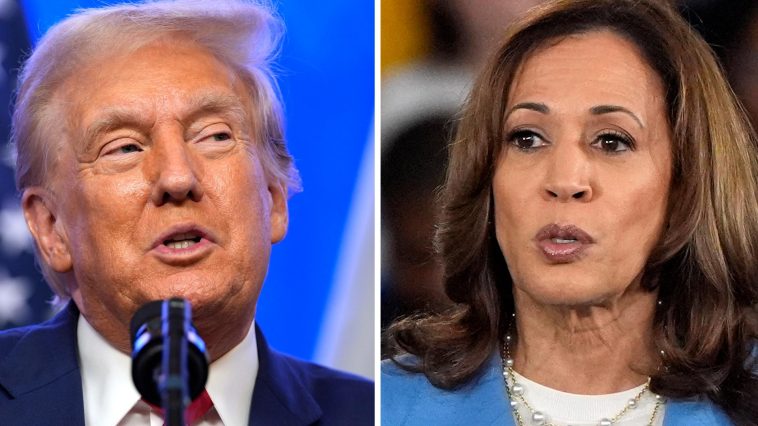Kamala Harris, the Vice President, is preparing to engage in an upcoming debate with ex-President Donald Trump. Despite her vocal objections towards the implemented rules, particularly the decision for candidates’ microphones to not be on live at all times, she has accepted the setup. It’s clear that these rules are not in her favor and could expose tactical weaknesses, a revelation that emerged on Wednesday following letters exchanged with the hosting network ABC News. This event marks the end of a heated dispute about microphone muting, a topic that nearly erupted into a full-blown crisis threatening to disrupt the Presidential debate scheduled for September 10 at the National Constitution Center in Philadelphia.
While Harris was begrudgingly accepting the rules, Donald Trump was gallivanting with his confidante Sean Hannity on Fox News Channel, opting for a one-man town hall as his version of debate preparation. Is this not an evident case of picking and choosing your battles? It’s rather obvious that this unconventional debate training session in the comfy environment of a supportive media outlet posed no real threat or challenge to the former President.
Joe Biden and his campaign, during their time, had pushed for the mic muting rule as a prerequisite to agree upon any debates. The idea was to fend off interruptions and outbursts from challengers. But as this decision backfired, resulting in a subpar performance for the Democratic incumbent, some campaign members expressed their regret. They ended up sheltering the audience from potential outbursts of truth from Trump during the June debate, leading to Biden’s premature exit from the race.
Kamala Harris had wished for live microphones for the candidates throughout the debate, supposedly to ensure a full-fledged exchange of ideas. However, this seems less like a genuine attempt at open dialogue and more of self-sponsored advocacy on the part of Democrats. Harris’s counselors later claimed that their candidate would be ‘fundamentally disadvantaged’ by the agreed format, conveniently forgetting that Trump too, would face the same constraints.
Harris’ camp, while expressing their discontent and attributing the muted microphone rule to the preference of Trump’s campaign, also sang a different tune concerning the debate format. They implied a fear that Trump might evade the debate entirely if the format was not suited to his preference. It seems the Democrats have begun making excuses preemptively.
Harris’ campaign succumbed finally, accepting the complete set of rules as proposed by ABC, including the muted microphones. Are they not contradicting themselves? On one hand, they term this format as disabling for their candidate, yet on the other hand, agree to it, displaying a confusing dichotomy of thought.
Interestingly, despite the muted conditions, journalists will be present to hear what the muted participant might be trying to articulate when their microphone is silenced. Is it coincidence or a deliberate choice? The network’s released debate rules, strikingly similar to the ones set up during the Trump-Biden period, stay mum about this detail.
In terms of format, ABC has set clear boundaries, including two commercial breaks across the 90-minute span. Also, moderation will purely be the responsibility of David Muir and Linsey Davis. One can’t help but wonder if this is a tactic to circumvent a disorderly debate or a genuine enforcement of discipline.
The mystery does not end here. An anonymous source from the Harris camp revealed that if a participant’s interruptions become habitual, a warning will be issued. In case of substantial crosstalk, both microphones might be unrestrained. It seems like they are preparing to bend the rules at their own discretion.
Here’s a bit of behind-the-scenes trivia: Donald Trump won a virtual coin toss and opted to deliver the final closing argument. Harris, in contrast, gambled on the aesthetics of the debate location, choosing to place herself on the right side of the viewers’ screen. This trivial coin toss embodies the completely different strategies adopted by these two candidates.
As per network orders, the debate will be held in vacuum, with no audience present, and no written notes allowed on stage. The network has also sworn to confidentiality, with none of the topics or questions proposed for the debate being shared upfront with either campaign or candidate. This arrangement, while claiming to be fair, leaves one wondering about the background dealings that go on unnoticed.
Hannity, during the town hall, led Trump through various topics familiar to the Republican campaign, accentuating the issues of immigration. After showing clips of Harris’ interviews, Trump deftly managed to shift the focus completely away from Harris and back to Biden. He termed the Democrats’ replacement of their top candidate as a claimed ‘coup’, indicating that he’d rather have a debate with Harris than a town hall discussion.
In an audacious move, Trump voiced his criticism towards ABC, designating it as ‘dishonest’ and ‘unfair’. He, rather reasonably, inferred that the Harris’ campaign could have advance knowledge of the posed questions, raising questions over the fairness of the debate.
Strategically, the debate is set in Philadelphia, reinforcing the importance of the disputed territory of Pennsylvania, boasting 19 Electoral College votes. In the political battleground with its unpredictable outcome, every manoeuvre matters. This choice of location cleverly underscores the strategic significance of Pennsylvania.
Without a doubt, the upcoming Harris-Trump debate promises to be a hothouse of strategy, maneuvering, and intrigue. Despite the façade of a balanced and open debate, the intricate election dance reveals the true colors of campaign strategy. Much remains to be seen in the debate as the buildup reaches its crescendo.


